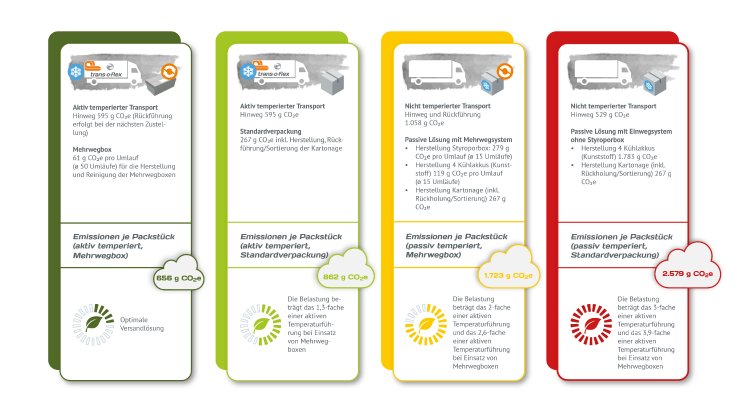- trans-o-flex's Expressdienst has compared CO2e emissions of actively and passively cooled consignments on the basis of scientific calculations
- CEO Albeck: "Increasing weather volatility renders risk-based approach unpredictable"
In the case of passive temperature control, the correct temperature is to be provided by cold packs and special packaging. With active temperature control, the load compartments of the trucks and the transhipment zones in the logistics centres are kept completely within the respective temperature range, which means that consignments do not require special packaging. For each of the two methods, trans-o-flex has calculated the level of climate impact (measured in CO2e) in two variants: with single-use and with returnable packaging. "It was to be expected that the returnable systems would have lower emissions than the single-use systems in both cases," says Albeck. "But the fact that active temperature control is so much more environmentally friendly than passive temperature control surprised us." The climate loads produced by passive temperature control are at least twice as high as those produced by active temperature control. In detail, the following four core results were obtained: the climate impact of active temperature control with reusable box is 2.63 times lower than passive temperature control with reusable box and 3.93 times lower than passive temperature control with disposable box; the climate impact of active temperature control with disposable box is twice (2.0) lower than passive temperature control and 2.99 times lower than passive temperature control with disposable box.
The analysis was conducted in three steps. Firstly, the greenhouse gas emissions (GHG) of a non-temperature-controlled shipment were calculated using the example of truck transport between Munich and Berlin. To do this – as well as for the other calculation steps – all direct and indirect GHGs were calculated in a well-to-wheel approach from the provision of a resource to its conversion into kinetic energy. These emissions are measured in terms of CO2 equivalents (CO2e), which means that other greenhouse gas emissions are taken into account in addition to carbon dioxide (CO2). In the second step, it was determined how much additional CO2e is produced when the consignments are transported with active temperature control. In the third step, the additional CO2e (compared to non-temperature-controlled transport) was determined when the consignments are passively temperature-controlled.
The scientific basis for the calculations was, on the one hand, the GLEC framework (Module 5), a globally recognised method for emissions reporting that covers all transport modes and transhipment points of global logistics chains. On the other hand, the results of the distance-based calculations according to the GLEC standard were checked for plausibility using the EcoTransIT calculator. "The EcoTransIT calculator developed in close cooperation with neutral institutes such as ifeu, INFRAS or Fraunhofer IML has confirmed the GLEC results," explains Albeck. "For example, for non-temperature-controlled transport, GLEC came to 47.63 kg CO2e per tonne and EcoTransIT came to 47.33."
To calculate emissions at package level, trans-o-flex used current average weights of packages transported by trans-o-flex. According to this, a package weighing 11 kilos is responsible for 656 g CO2e when actively temperature-controlled (in returnable packaging) between Munich and Berlin. However, if a package is transported on the same route with passive packaging (single-use system without a polystyrene box), 2,579 g of CO2e are produced per package. If a returnable system is also used for passive temperature control, then 1,723 g of CO2e are still produced per package. "In addition to the 2 to 4 times higher climate impact, passive temperature control also means additional cost and effort in disposing of the temperature loggers, handling the cold packs and stocking them," says Albeck.
Albeck considers the varying degrees of security associated with the different transport methods to be equally important. "According to the World Health Organization (WHO) and the Parenteral Drug Association, nearly one in five health products is damaged during transport due to a break in the cold chain." And this happens above all when the "risk-based approach (= without temperature control) or passive temperature control in medicine transport" is used. "The risks of these modes of transport have always been there, but they have become unpredictable, not least given the increasing volatility of the weather and more transport delays due to congestion."


